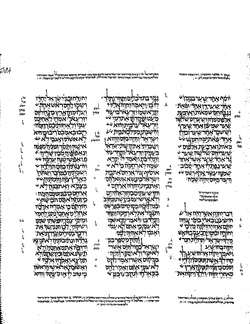Zephaniah 2
Zephaniah 2 is the second chapter of the Book of Zephaniah in the Hebrew Bible or the Old Testament of the Christian Bible.[1][2] This book contains the prophecies attributed to the prophet Zephaniah, and is a part of the Book of the Twelve Minor Prophets.[3][4] This chapter contains a call to penitence and oracles against nations.[5]
| Zephaniah 2 | |
|---|---|
 | |
| Book | Book of Zephaniah |
| Category | Nevi'im |
| Christian Bible part | Old Testament |
| Order in the Christian part | 36 |
Text
The original text was written in Hebrew language. This chapter is divided into 15 verses.
Textual witnesses
Some early manuscripts containing the text of this chapter in Hebrew are of the Masoretic Text tradition, which includes the Codex Cairensis (895), the Petersburg Codex of the Prophets (916), Aleppo Codex (10th century), Codex Leningradensis (1008).[6] Fragments containing parts of this chapter in Hebrew were found among the Dead Sea Scrolls, including 4Q77 (4QXIIb; 150–125 BCE) with extant verses 13–15;[7][8][9] 4Q78 (4QXIIc; 75–50 BCE) with extant verse 15;[8][9][10] and Wadi Murabba'at Minor Prophets (Mur88; MurXIIProph; 75-100 CE) with extant verses 1–15.[8][11]
There is also a translation into Koine Greek known as the Septuagint, made in the last few centuries BC. Extant ancient manuscripts of the Septuagint version include Codex Vaticanus (B; B; 4th century), Codex Sinaiticus (S; BHK: S; 4th century), Codex Alexandrinus (A; A; 5th century) and Codex Marchalianus (Q; Q; 6th century).[12] Fragments cumulatively containing all verses of this chapter (a revision of the Septuagint) were found among the Dead Sea Scrolls, i.e., Naḥal Ḥever (8ḤevXIIgr; 1st century CE) with extant verses 9-10.[8][13]
A Call to Penitence (2:1-3)
Following a tradition of Amos (5:4-5), a call of penitence is given after the threats of total disaster.[14]
Oracles against the Nations (2:4–15)
The nations spoken here represent Israel's enemies at 'the four points of the compass', so the oracles may function to establish Yahweh as 'the Lord of the Four Quarters of the Earth' or 'the Lord of the whole world'.[15]
Verse 4
- For Gaza shall be forsaken,
- And Ashkelon desolate;
- They shall drive out Ashdod at noonday,
- And Ekron shall be uprooted.[16]
- "Gaza", "Ashkelon", "Ashdod", "Ekron" - Four of the usual five leading cities of the Philistines are mentioned. Gath is omitted, being at this time under the dominion of Israel/Judah. King David had subjugated it (1 Chronicles 18:1). Under Joram the Philistines almost regained it (2 Chronicles 21:16), but Uzziah (2 Chronicles 26:6) and Hezekiah (2 Kings 18:8) conquered them, so it remained under the Judah. Amos 1:6; Zechariah 9:5,6; Jeremiah 25:20, similarly mention only four cities of the Philistines.[17]
Verse 5
- Woe to the inhabitants of the seacoast,
- The nation of the Cherethites!
- The word of the Lord is against you,
- O Canaan, land of the Philistines:
- "I will destroy you;
- So there shall be no inhabitant."[18]
- "Cherethites" refers to the Cretans, a name applied to the Philistines as sprung from Crete (Deuteronomy 2:23; Jeremiah 47:4; Amos 9:7). Philistine means "an emigrant."[17]
See also
- Related Bible parts: 2 Kings 22, Jeremiah 47, Amos 1, Zechariah 9
References
- Collins 2014.
- Hayes 2015.
- Metzger, Bruce M., et al. The Oxford Companion to the Bible. New York: Oxford University Press, 1993.
- Keck, Leander E. 1996. The New Interpreter's Bible: Volume: VII. Nashville: Abingdon.
- Mason 2007, pp. 605–606.
- Würthwein 1995, pp. 35-37.
- Ulrich 2010, p. 617.
- Dead sea scrolls - Zephaniah
- Fitzmyer 2008, p. 38.
- Ulrich 2010, p. 618.
- Fitzmyer 2008, pp. 140-141.
- Würthwein 1995, pp. 73-74.
- Fitzmyer 2008, p. 127.
- Mason 2007, p. 605.
- Mason 2007, p. 606.
- Zephaniah 2:4 NKJV
- Jamieson-Fausset-Brown Bible Commentary
- Zephaniah 2:5 NKJV
Sources
- Collins, John J. (2014). Introduction to the Hebrew Scriptures. Fortress Press. ISBN 9781451469233.CS1 maint: ref=harv (link)
- Fitzmyer, Joseph A. (2008). A Guide to the Dead Sea Scrolls and Related Literature. Grand Rapids, MI: William B. Eerdmans Publishing Company. ISBN 9780802862419.CS1 maint: ref=harv (link)
- Hayes, Christine (2015). Introduction to the Bible. Yale University Press. ISBN 0300188277.CS1 maint: ref=harv (link)
- Mason, Rex (2007). "35. Zephaniah". In Barton, John; Muddiman, John (eds.). The Oxford Bible Commentary (first (paperback) ed.). Oxford University Press. pp. 604–607. ISBN 978-0199277186. Retrieved February 6, 2019.
- Ulrich, Eugene, ed. (2010). The Biblical Qumran Scrolls: Transcriptions and Textual Variants. Brill.CS1 maint: ref=harv (link)
- Würthwein, Ernst (1995). The Text of the Old Testament. Translated by Rhodes, Erroll F. Grand Rapids, MI: Wm. B. Eerdmans. ISBN 0-8028-0788-7. Retrieved January 26, 2019.
External links
| Wikisource has original text related to this article: |
| Look up Zephaniah in Wiktionary, the free dictionary. |
- Jewish translations:
- Zephaniah (Judaica Press) translation with Rashi's commentary at Chabad.org
- Christian translations:
- Online Bible at GospelHall.org (ESV, KJV, Darby, American Standard Version, Bible in Basic English)
